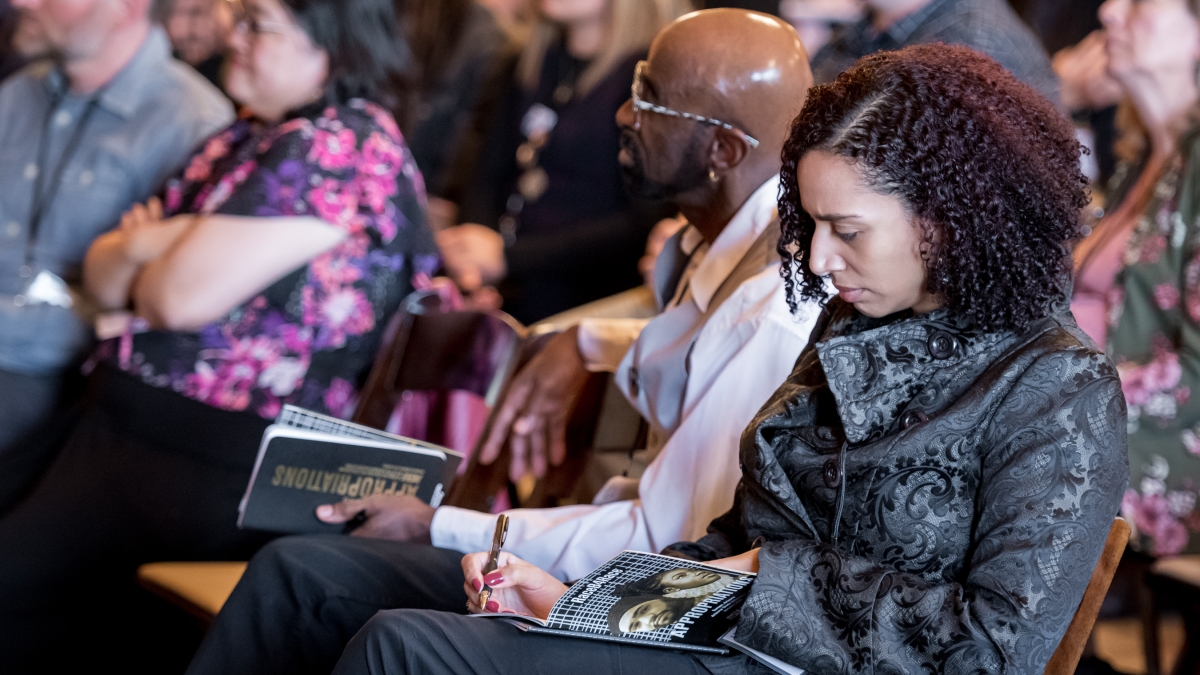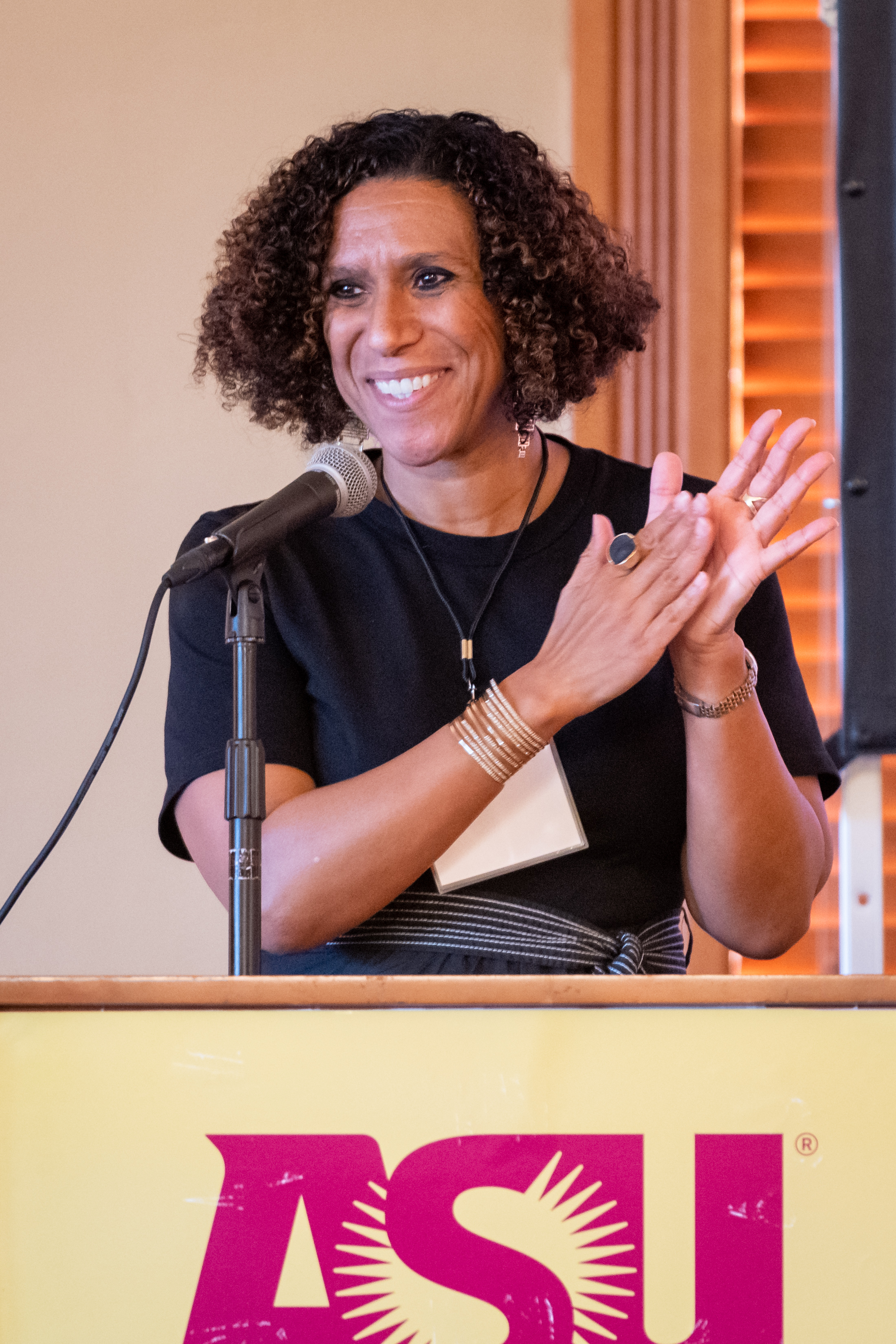ASU center receives grant to expand, diversify premodern critical race scholarship

In 2019, the Arizona Center for Medieval and Renaissance Studies at Arizona State University made a definitive statement to the academic world about the issue of race in premodern studieswork that covers the ancient period up the 17th century when it hosted its inaugural RaceB4Race conference: Not only did race exist as a social issue back then, it deserves to be reconsidered in our modern-day interpretations of classical texts.
In the years since then, the RaceB4Race symposium — which comprises the ongoing conference series as well as a professional network community for scholars from across the country to engage on issues of race in premodern literature, history and culture — has grown considerably. Now, the Andrew W. Mellon Foundation is recognizing the impact RaceB4Race is making with a $3.5 million collaborative, cross-institutional grant to be dispersed over three years.
Ayanna Thompson
“The investment that ASU has made in premodern studies is unprecedented, and the Mellon grant allows us to sustain, build and innovate the important work we started with RaceB4Race,” said Ayanna Thompson, director of the Arizona Center for Medieval and Renaissance Studies and creator of the RaceB4Race symposium. “There can be no doubt now that ASU is leading premodern studies in the 21st century.”
The goal of the grant is to expand and diversify the reach and tools available to those contributing to the robust body of premodern critical race scholarship, which, while having revealed some of the earliest formations and elements of systemic racism, has yet to find its way into higher education curricula and wider public discourse.
“Our understanding of the foundations of our society from the past is essential,” said ASU President Michael M. Crow. “We created the destructive social construct of race over time, and need to understand how and why. This focused grant helps us to sort out and solve for this significant error.”
Jeffrey Cohen, dean of humanities in The College of Liberal Arts and Sciences at ASU, also expressed enthusiasm for the grant’s potential.
“Under the visionary leadership of Ayanna Thompson, the Arizona Center for Medieval and Renaissance Studies has become the leading international voice for finding in the past visions for a more just and humane future,” he said. “The center’s work on premodern critical race studies has been trailblazing, and to see its endeavors so robustly supported by the Mellon Foundation (itself a model for transforming the humanities) is a dream come true.”
Video by the Arizona Center for Medieval and Renaissance Studies
The grant will provide funding for the hiring of new staff members, postdoctoral fellows, predoctoral fellows and undergraduate students to engage in activitiesSome of the activities will be housed at Rutgers, The State University of New Jersey, headed up by Patricia Akhimie, and at Brandeis University with Dorothy Kim — both original members of the RaceB4Race executive board. that include:
- Creating a full spectrum of premodern critical race studies content for use in higher education. This content will be a range of free material from exemplar syllabi and recommended readings for specific courses, units of study, standalone modules (for hybrid and online teaching), web-based annotated texts and primary documents, mini lectures (both audio- and video-based), demonstration lectures and recorded roundtables. These materials will be freely available.
- Addressing the early stages in the academic pipeline by inviting postdoctoral fellows, predoctoral fellows and undergraduates to create Gen Z-targeted peer-to-peer social media content that reveals and explores premodern globalism and the earliest constructions of racial formations. The vast majority of this content will be researched, designed and created by postdoctoral and predoctoral fellows.
- Changing the way scholars and graduate students are mentored in premodern critical race studies by developing a horizontal community of care that specifically addresses several different inflection points in a scholar’s career, such as isolation in their field and/or in their home department/institution; under-advisement about what it actually takes to transform one’s premodern/interdisciplinary critical race scholarship into a book; and multiple, competing institutional demands prior to promotion to full professor.
- Training scholars and postdoctoral and predoctoral fellows in digital, personal and institutional safety as is prudent of those encouraged to become public intellectuals.
- Supporting the development of premodern critical race scholars as public intellectuals in an effort to address a current dearth of diversity among scholars in the field. In two separate cycles during the course of the grant, a yearlong virtual workshop will be held to train cohorts of up to six scholars on the ins and outs of being a public intellectual.
This is a win not only for RaceB4Race but the field of premodern studies at large.”
— Associate Professor Ruben Espinosa
Ruben Espinosa, a noted Shakespeare scholar who is the author of “Shakespeare on the Shades of Racism,” joined ASU in March as an associate professor of English and associate director of the Arizona Center for Medieval and Renaissance Studies.
“ASU’s RaceB4Race has redefined the way we think about premodern studies,” Espinosa said. “With its field-changing, visionary programming, RaceB4Race has quickly ascended as one of the most significant professional network communities in the nation for premodern scholars of color. Without doubt, the Mellon grant allows RaceB4Race not only to deliver on its commitment to promote premodern critical race studies, but it will also provide us with the resources and opportunities to lead our field in exciting new directions with racial justice at the fore. This is a win not only for RaceB4Race but the field of premodern studies at large.”
Both Thompson and Espinosa look forward to seeing how the knowledge creation and dissemination systems made possible by the grant will challenge the European medieval structure of the academy — a system they say prioritizes individuality, competition and exclusion — and model what it means to re-create it in a structure that prioritizes the collective, cooperation and inclusivity.
Top photo: Scholars take notes during the "Appropriations: A RaceB4Race Symposium" event at ASU's Tempe campus in January 2020. Photo courtesy of the Arizona Center for Medieval and Renaissance Studies
More Arts, humanities and education

Professor's acoustic research repurposed into relaxing listening sessions for all
Garth Paine, an expert in acoustic ecology, has spent years traveling the world to collect specialized audio recordings.He’s been to Costa Rica and to Ecuador as part of his research into innovative…

Filmmaker Spike Lee’s storytelling skills captivate audience at ASU event
Legendary filmmaker Spike Lee was this year’s distinguished speaker for the Delivering Democracy 2025 dialogue — a free event organized by Arizona State University’s Center for the Study of…

Grammy-winning producer Timbaland to headline ASU music industry conference
The Arizona State University Popular Music program’s Music Industry Career Conference is set to provide students with exposure to exciting career opportunities, music professionals and industry…


